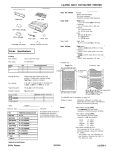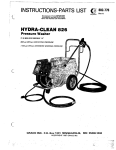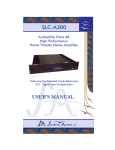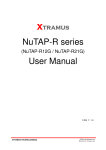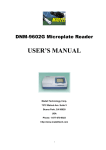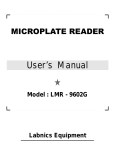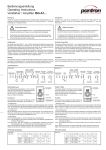Download Aetna HP6492 User's Manual
Transcript
PRECISION SENSITIVE DIGITAL TACHOMETER INSTAllATION INSTRUCTIONS . Special Instructions for '-SM' &'-SH' Versions Aetna Engineering Precision Sensitive Digital Tachometers are premium quality instruments. Th.ey use "LSI" digital circuitry to provide an instrument guaranteed accurate to one RPM, that. never requires calibration, and performs reliably in the marine environment. The '-S_' version tachometers are supplied with a special ratio setting designed to operate from the signal provided from a "mag-pickup. or other sensor which receives a particular number of pulses-per-revolution (PPR) from the rotating device to be measured. The PPR ratio refers to the preset number of pulses the tachometer must detect for each revolution of the apparatus to be measured. The '-SM' version is rated for use between 28 and 90 PPR and the '-SH' version is rated for use between 90 and 255 PPR. The overc:ill tachometer performance involves functions beyond the PPR ratio, such as filter constants and signal sensitivity. Therefore, the correct version, '-SM' or '-SH' must be used for the specific PPR ratio desired or satisfactory performance will not be realized. The tachometers are available with either Light Emitting Diode (LED-Model 8402) or Liquid Crystal Display (LCD-Model 8905) readouts. The LED is best suited for use in shaded sunlight while the LCD should be used in applications where the tachometer will be exposed to direct unshaded sunlight. Both are self-illuminated for night viewing. The tachometers are supplied with a choice of black or polished stainless steel bezel. The black bezel tachometer includes a trim ring which can be optionally used as required to match existing. instrumentation. Aetna tachometers also fit perfectly inside both the round and square VDO Blue Line cases (contact us for detailed instructions). I Mounting: Select a mounting location where the tachometer may be easily read. The front of the tachometer has a gasketed glass-to-metal seal making it suitable for use in locations exposed to rain and spray. It uses only non-ferrous materials so it can be located in close proximity to a compass without significantly affecting the compass (nevertheless, the compass adjustment should be checked after installation; particularly because the removed tachometers may have been influencing the compass). The unit may be installed in an existing standard 3-3/8 inch diameter hole. It will fit holes up to 4 inches when used with the optional black trim ring. If placing the tachometer under a protective glass cover, be sure that it is adequately ventilated to keep the maximum temperature of the case below 175 degrees Fahrenheit. Exceeding this case temperature may damage the tachometer. Mount the tachometer using the clamp and hardware provided. In exposed locations it should be bedded down with a bead of sealant behind the flange. Place the tach in the raised trim ring if it is to be used. If the trim ring is positioned so that it will collect water, drill a 3/16" drain hole at the lowest point in the ring. The clamp legs may be bent over or cut off to accommodate thicker panels. An O'ring is included for use as. a centering aid when installing the unit in 3-3/8 inch holes. If the hole is tight, roll the O'ring back from the flange then insert the tach so that the O'ring rolls into the hole as the tach is inserted. For larger holes an Oaring type spacer may be made from a length of appropriate diameter wire. " Wiring: During wiring it is recommended that the negative battery cable be removed from the battery or the master switch(es) turned off. The tachometer has a grounded case and is for use on negative ground systems only (an isolated case version is available for isolated or positive ground use.) Connect the "Ground" terminal to a point that is connected to the negative (-) battery terminal. Connect the "+12V" terminal to a point that is. energized when the ignition is switched on; typically a purple wire. In most cases, power and ground are available by wiring to the terminals on an adjacent temperature or oil pressure gauge. A one amp fuse must be installed in series with the "+" (Pos) wire in order to enable the internal surge protectorfunction. To use the Model 8402 on 24 volts connect a 30 ohm, 25 watt resistor (our Model 8924) in series with the "+12V" tachometer terminal. For 32 volts use a 47 ohm, 25 watt resistor (our Model 8932). Failure to use the appropriate ballast resistor may damage the Model 8402 tachometer. The "+12V" terminal on the Model 8905 tach. may be safely connected to 12, 24 or 32 volt systems without a ballast resistor. The "Points" (8ig.) terminal connects the RPM information signal from the engine to the tachometer. This connection should be made using stranded two conductor twisted-shielded wire. For multiple stations, two or more tachometers may be connected in parallel. Diesel engines have no ignition and therefore require a tachometer sender to generates the digital impulses required by the tachometer. Traditionally a mechanically driven sender was mounted on the tachometer drive cable fitting on the engine. Many newer engines do not have such a fitting and instead use a magnetic pickup. A "mag.. pickup is a device that senses the passage of gear teeth in a non-contact manner. It is screwed into a threaded hole in the gear housing and adjusted so that the clearance is approximately one-half turn back from contact with the gear. The two sender wires are connected to the signal and ground terminals at the tachometer using a twisted/shielded cable. Connect the two wires from the sender through the two twisted inner conductors. Connect the shield to the engine block. Do not connect the tachometer end of the shield. If the signal is continued on to another tachometer, carry the shield connection through but do not connect it to anything but the engine. Using a single wire and the engine ground is not recommended and will yield inferior results. Diesel Sender Installation: The Aetna Engineering Models 8910, 8912 and 8922 are magnetically coupled senders which sense the passage of flywheel gear teeth or similar items. They generates the electrical RPM signal used by the tachometer. The 8910 and 8912 are housed in a %" diameter by 16 threads per inch case while the 8922 is contained in a 5/8" by 18 threads per inch case. Both the 8912 and 8922 have dual electrical outputs. Note that some engines built offshore have metric sized sender mounting holes. Although Aetna does not provide metric sized senders, most metric "mag pickup. senders will satisfactorily drive Aetna tachometers. The sender is installed by screwing it into a threaded hole on the flywheel bell housing or other housing. It is screwed in until the end contacts the gear then backed-off one-half turn and sequredin position with the jam nut. The sender is connected to the tachometer using two conductor twisted-shielded wire as previously described. This combination of tachometer and sender will register the engine speed accurately to within +/one RPM when the sender is driven at exactly the preset number of pulses-per-revolution rated on the tachometer Testing: Reconnect the battery and turn the ignition on. The display should illuminate and show "0000" indicating power is reaching the unit. Start the engine and verify that the display indicates engine RPM. When the engine is cold and idling without load the right hand digits may seem to "jump." This is due to fluctuation in the engine speed and is pronounced because the readout displays variations as small as one RPM. The RPM's should steady when the engine is warmed and operated above idle under a constant load. Should the display continue to jump excessively check engine tuning, look for a fouled injector or a fuel suction line air leak. Contact the factory for more suggestions. \ If the tachometer shows all zeros with the engine running, check the signal wiring from the engine. If the tachometer's digits fail to show at all, the problem is in the power wiring to the tachometer and not in the signal wiring. If the indicated RPM is in error, check that the ratio select switches are set properly. The tachometer includes special circuitry to minimize loran interference from the digital processor. Nevertheless, if a loran set is aboard, it should be checked for interference by obseNing the loran SNR when the ignition is on without the engine running. Be sure any interference isn't from an alarm buzzer or bell. If interference is detected, check the loran antenna & ground or install a filter, such as the "MAR-P5" from Marine Technology (562) 595-6521, in the +12 volt power and ground leads to the tachometer. The tachometer is now ready to use. No adjustment is ever necessary. The circuftry employs a piezoelectric crystal to permanently maintain calibration. On the Model 8402 the built-in dimmer senses the ambient light. and adjusts the display intensity for comfortable viewing. When operated in bright light the case will feel warm to the touch. This is normal and will not damage the unit provided the case temperature does not exceed 175 degrees. The Model 8905 has internal backlighting provided by solid state lamps that do not require routine replacement. The 8905 consumes less than one-half watt and does not create significant heat. A special anti-fogging compound is applied to the inside of the glass during manufacture. Internal fogging of the glass may be reduced by removing the ratio switch cap. In cases of persistent fogging,. contact the factory for additional help. No routine maintenance of the tachometer is required. Clean the glass with a soft cloth, The sensor end of the sender should be cleaned periodically of any accumulation of magnetic particles which can shunt the magnetic sensitivity. The sender may be tested with an ohmmeter. Measurement of the resistance on the leads should be between 100 and 1000 ohms. During installation, wiring can be verified by temporarily running a separate wire pair directly from the sender to the tachometer. Limited Warranty Aetna Engineering warrants its tachometers to be free of defects in material and workmanship for a period of two years from the date of purchase as shown on the original consumers purchase receipt. Warranty seNice will be provided free of charge if the unit is delivered to Aetna Engineering during the warranty period accompanied by original consumer proof of purchase. Any transportation, removal, or reinstallation charges will be paid by the purchaser whenever incurred in connection with this warranty. In absence of proof of purchase receipt, the warranty period shall be twd years from the date of manufacture. This warranty does not apply to units subjected to misuse, neglect, accident, incorrect installation wiring, improper installation, water damage, or units used in violation of the installation instructions furnished by us. This warranty excludes any incidental or consequential damages connected with failure or defect in the product. . Aetna Engineering products are not designed, intended or approved for use on or involving aircraft or in hazardous locations. This warranty gives you specific legal rights and you may have other rights which vary from state to state. . Aetna Digital Tachometers SWITCH SETTING INSTRUCTIONS For use by Factory Authorized personnel- Only V-ersion '-SH' '-SM' Version Switch PPR 28 29 3J 31 32 33 '34 35 36 37 1 0(( off off off o(f off off off off off 2 off 38 0(( of( 39 40 41 42 43 44 45 46 47 48 49 :D 51 52 53 54 55 56 57 53 59 EO 61 62 63 64 65 66 67 63 ffi 70 71 72 73 74 75 76 77 78 79 80 81 82 83 84 85 86 87 88 89 00 0(( off of( of( of( off off off off off off off off off off off of( off off off off off of( off off off off off off off off off of( off off off off off of( off off off off off oif off off off off off off off off off off off off off off off Or) off on off on off on off on off on off on off on off on off on off on off on off on off on off on off on off on off on off on off on off on off on off on off on of( on off on off on 3 o(f off off off on on on on on on on on on on on on on on on on on on on on on on on on on on on on on on on on off off off off off off off off off off off off off off off off off off off off off off off off off off off 5 4 on on on on on on on on off off off off off off off off of( off off off off 0(( off off of( on off on off on of( on off on off on off on off on on off on of( on off on off on off on off on off on off on on on on on on on on on on on on on on on on off off off off off off off off off off off off off off off off off on off on off on off on off on off on off on off on on off on off on off on off on off on off on off on off on on on on on on 7 6 on off on off on on on on off off 0(( off off on off on on of( on off on on on on off off off off off on off on on off on off on on on on off off of( off off on off on on off on off on on on on off off off off off on off on on off on off on on on on off off off off off on off on on off on off on on on on off off off off off on off on on off on off on on on on off off off off off on off on on off on off on on on on off off off off off on Switch PPR Position 8 0(( on off on off on 0(( on off on off on Qff on off on off on off on off on of( on off on off on off on off on off on off on off on off on off on off on off on off on off on off on off on off on off on off on off on off . 91 92 93 94 95 96 97 93 99 100 101 102 103 104 1C6 106 107 100 100 110 111 112 113 114 115 116 117 118 119 120 121 122 123 124 125 126 127 128 129 13J 131 132 133 134 135 136 137 138 133 14) 141 142 143 144 145 146 147 148 149 1:D 151 152 153 2 on 0(( on 0(( on 0(( on 0(( on 0(( on off on off on o(f on off. . on off on. off on off on off on off on off on off on of( on off on off on off on of( on off on off on off on off on off on off on off on off on off ori off on off on off on off on off on off on on off on off on off on off on off on off on off on off on off on off on off on off on off on off on off on off on off on off on off on off on off on off on off on off on off on off 1 off 3 off off of( 0(( off on on on on on on on on on on on on on on on on on on on on on on on on on on on on on on on on off off off off off. off off off off off off off off off off off off off off off off off off off off off 4 on on on on on of( of( off off off off off of( off off of( off off off off off on on on on on on on on on on on on on on on on off off off off off off off off off off off off off off off off on on on on on on on on on on Position 5 on on on on on off 0(( off off off 0(( off off on on on on on on on on off off off of( off off off off on on on on on on on on off off off off off off off off on on on on on on on on off off off off off off off off on on 7 on of( of( on on off off on on off on of( on on on on off off off off off on off on on off on off on on on on off off of( off of( on off on on off on off on on on on off off off off off on off on on off on off on on on on off off off off off cn off on on off on off on on on on Qff off off off off on off on on off on off on on on on off off off of( off on of( on on off on off on on on on off off off off 6 off on on on on off off off off on 8 on 0(( on off on of( on 0(( on 0(( on off on off on off on off on off on off on off on off on off on off on off on off on off on off on off on off on off on off on off on off on of( on off on off on off on off on off on Aetna Digital Tachometers SWITCH SETTING INSTRUCTIONS For use by Factory Authorized Personnel '-SH' Version 154 155 156 157 158 .159 100 161 162 163 164 165 166 167 168 169 170 171 172 173 174 175 176 177 178 179 180 181 182 183 184 185 186 187 188 100 100 191 192 193 194 195 196 197 100 100 2!JO 2!J1 2!J2 2!J3 204 1 on on on on on on on on on on on on on on on on on on on on on on on on on on on on on on on on on on on on on on on on on on on on on on on on on on on 4 3 2 off off on off off on off off on off off on off off on off off on off on off off on off off on off off on off off on off off on off off on off off on off off on off off on off off on off off .on off off on off off on off off on off off on off off on on off on on off on on off on on off on on off on on off on on off on on off on on off on on off on on off on on off on on off on on off on on off on on on off off on off off on off off on off off on off off on off off on off off on off off on off off on off off on off off on off off on off off 5 on on on on on on off off off off off off off off on on on on on on on on off off off off off off off off on on on on on on on on off off off off off off off off on on on on on 6 off off on on on on off off off off on on on on off off off off on on on on off off off off on on on on off off off off on on on on off off off off on on on on off off off off on Switch PPR Switch Position PPR 7 on on off off on on off off on on off off on on off off on on off off on on off off on on off off on on off off on on off off on on off off on on off off on on off off on on off 8 off on off on off on off on off on off on off on off on off on off on off on off on off on off on off on off on off on off on off on off on off on off on off on off on off on off 205 206 2!J7 200 200 210 211 212 213 214 215 216 217 218 219 22!J 221 222 223 224 225 226 227 228 229 23J - 231 232 233 234 235 236 237 238 239 240 241 242 243 244 245 246 247 248 249 2f() 251 252 253 254 255 Only 1 on on on on on on on on on on .on on on on on on on on on on on on on on on on on on on on on on on on on on on on on on on on on on on on on on on on on 2" on on on on on on on on on on on on on on on on on on on on on on on on on on on on on on . on on on on on on on on on on on on on . on on on on on on on on 3 off off off off off off off off off off off off off off off off off off off on on on on on on on on on on on on on on on on on on on on on on on on on on on on on on on on 4 off off off on on on on on on on on on on on on on on on on off off off off off off off off off off off off off off off off on on on on on on on on on on on on on on on on Position 5 on on on off off off off off off off off on on on on on on on on off off off off off off off off on on on on on on on on off off off off off off off off on on on onon on on on 6 on on on off off off off on on on on off off off off on on on on off off off off on on, on on off off off off on on on on off off off off on on on on off off off off on on on on. 7 off on on off off on on off off on on off off on on off off on on off off on on off off on on off off on on off off on on off off on on off off on on off off on on off off on on 8 on off on off on off on off on off on off on off on off on off on off on off on off on off on off on off on off on off on off on off on off on off on off on off on off on off on Procedure: Position the switches according to the table using a thin stylus such as the metal 1Ir .froma all point pen. Care should be taken to use only moderate pressure in actuating the mdlvldual sWitches to avoid damaging them. Use of plenty of light and magnification can be helpful. Switch #1 is on the left, #8 on the right; up is on and down is off.





